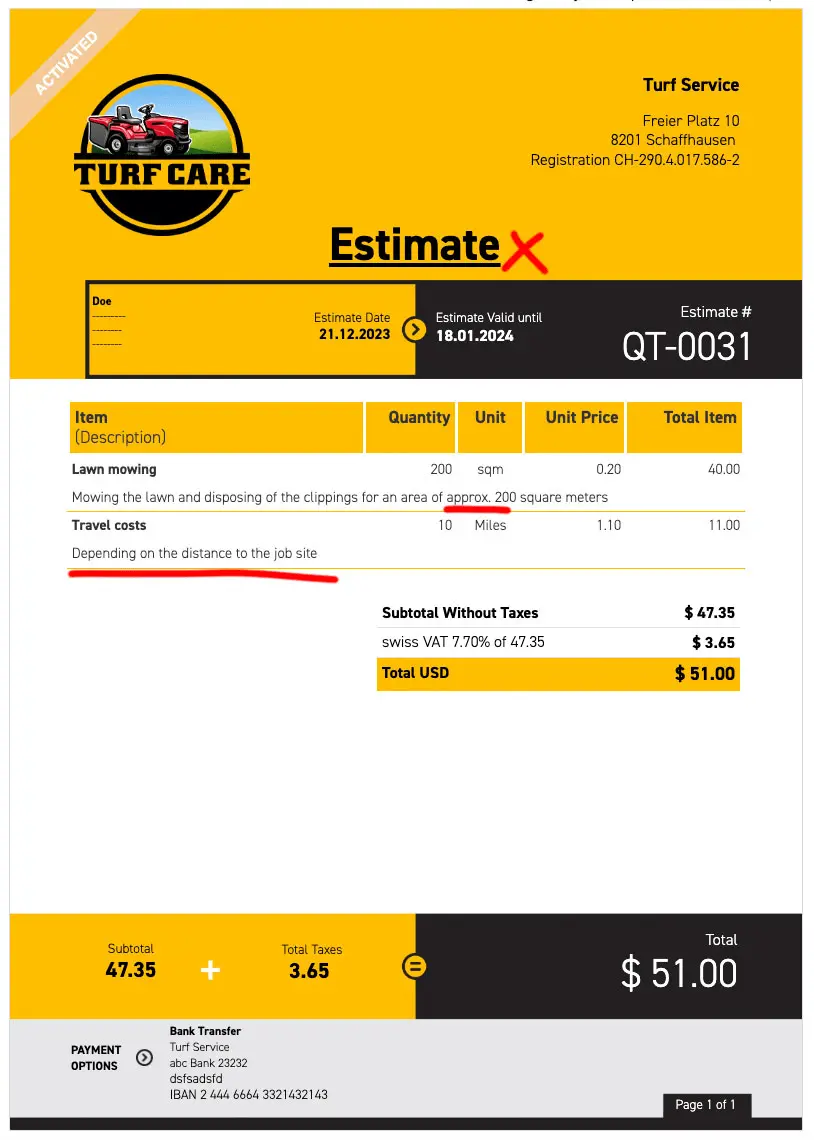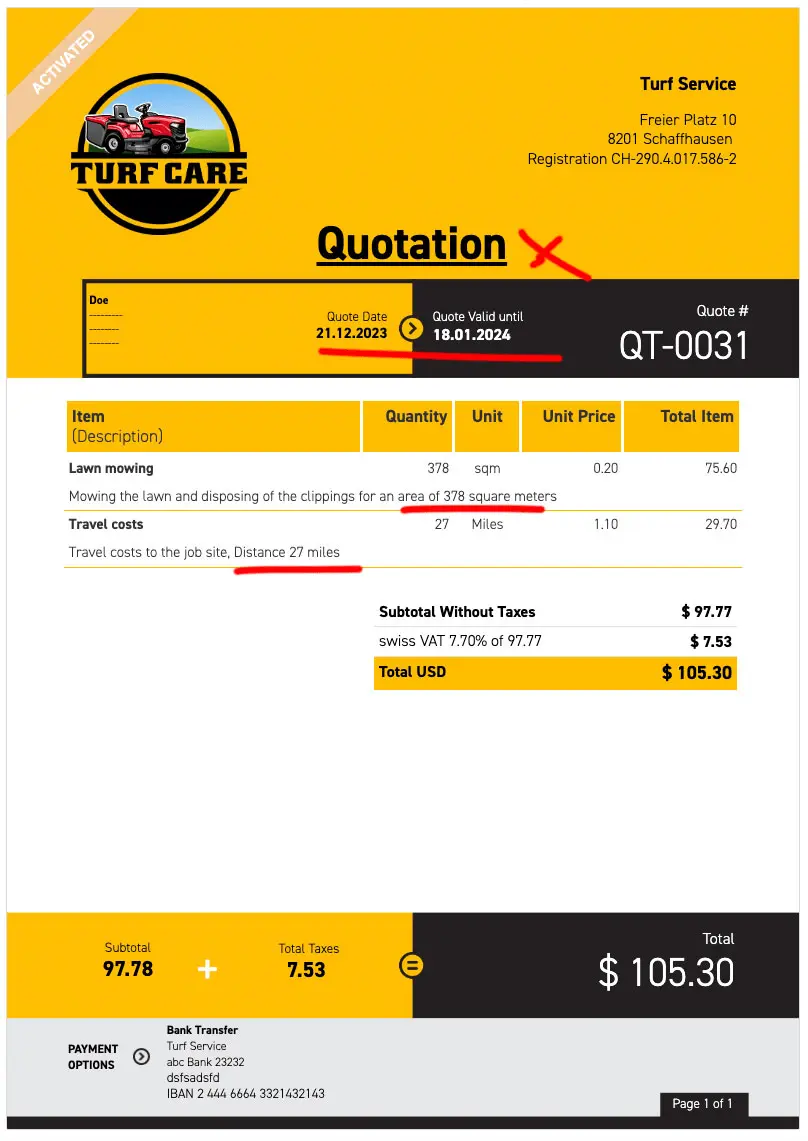Each tool – estimates, sales quotes, and business proposals - plays a quintessential role in business negotiations, each with a distinct purpose, structure, and impact. The strategic use of these tools can greatly enhance your chances of securing high-value deals. However, the process of creating estimates, quotes, and proposals can be complex and time-consuming.

This is where zistemo comes into the picture. As a comprehensive business management tool, zistemo simplifies the creation of estimates, sales quotes, and business proposals. It allows you to generate cost projections, detailed quotes, and compelling proposals easily and efficiently, saving you a huge amount of time and effort.
With zistemo, you can effectively navigate through business negotiations, providing an impressive presentation of costs and showcasing an enticing image of the value and benefits that your services bring to the table. Thus, zistemo not only enhances your operational efficiency but also strategically positions your business to secure high-value deals.

An overview of the importance of understanding the differences between estimates, sales quotes, and business proposals in business negotiations.
In the intricate world of business negotiations, the ability to discern the distinctions between estimates, sales quotes, and business proposals is not just a skill, but an art. These three essential elements, while bearing similarities, each play a critical role in the sales process and possess unique characteristics.

At zistemo, we have mastered the art of estimates, quotes, and business proposals. An estimate gives you a sneak peek of what it will cost, while a proposal guarantees a price for a certain time. But wait, that’s not all! A business proposal takes it up a notch and allows you to showcase the true value of your services, engage your potential customers, and close the deal. Mastering these nuances can make the difference between a missed opportunity and a successful business negotiation. Get ready to soar!
Understanding Estimates
Definition of an estimate
An estimate, in the business context, can be defined as a preliminary calculation or assessment that provides a general idea about the expected cost of a project or a service. It’s essentially a rough guess, based on the available information at the time. It’s important to note, however, that an estimate is not binding, as it’s subject to change depending on various factors such as fluctuations in the cost of materials or labor, changes in the scope payment schedule of the project, or unexpected contingencies.

When and why to use estimates
Estimates come into play early in the sales process—typically when a prospective buyer is exploring different service providers and trying to budget their project. The primary use of an estimate is to give the client a ballpark figure of the likely costs, helping them to make an initial assessment of the feasibility and affordability of the project.
It’s worth noting that while estimates give a rough idea of costs, they should still be grounded in reality and be based on practical data and experience so as not to mislead the client. This early exchange can also serve as a test of compatibility between you and the prospective client regarding budget expectations.

Advantages and pitfalls of using estimates
One of the major advantages of using estimates is their ability to initiate dialogue with prospective buyers early in the sales process.
They provide a quick, general idea of the possible costs involved, helping potential clients assess if a project aligns with their budget constraints. Estimates can also demonstrate your business’s professionalism and your understanding of the project at hand, which can help build trust with the client.
However, estimates also come with potential pitfalls. Since they’re based on limited information and are not fixed, they can sometimes be inaccurate, leading to discrepancies between the estimated and actual costs. This could result in dissatisfaction or conflict with a legal team or the client down the line.
Furthermore, if an estimate is too vague or unrealistic, it could potentially mislead the client and damage the trust you’re trying to build. Therefore, it’s essential to make it clear to the client that an estimate is just that—an estimate—and the final costs may vary.

Your key to a professional estimate
At zistemo, we know how important estimates are in the fast-paced world of business negotiations. Our platform is designed with a keen understanding of the unique challenges businesses face in drafting accurate, realistic, and professional estimates.
Zistemo provides a seamlessly intuitive interface that enables you to effortlessly generate and send estimates in your corporate design, saving you valuable time and resources. Additionally, our platform is designed to grow with your business. Whether you’re a small business starting or a large corporation with complex needs, Zistemo adapts to your changing requirements.
Moreover, our platform provides the flexibility to convert estimates into projects or invoices once approved—streamlining your sales process and ensuring a seamless transition from initial sales success cost estimation to final billing.
With Zistemo, your estimates aren’t just numbers; they’re a reflection of your business’s professionalism, efficiency, and commitment to transparency. Choose Zistemo, and elevate the way you create and manage your estimates.
Key Point
Estimates provide a preliminary assessment of project costs, aiding clients in budgeting. While useful in initiating dialogue, they can risk inaccuracies, potentially leading to client dissatisfaction.
The Specifics of Sales Quotes
Definition of a sales quote
A sales quote, also known as a price quote, diverges from an estimate by providing a set price for a particular product or service, applicable for a specified period. It serves as a more formal document of pledge from the business to offer goods or services at the listed price.
Unlike an estimate that merely approximates the cost, a sales quote is legally binding for the period specified in the document. This means that even if market prices fluctuate, the seller is obligated to honor the quoted price during the validity period.

The Role of Sales Quotes in the Negotiation Process
Sales quotes play a pivotal role in the negotiation process. Often issued after the initial discussion phase, they help establish the formal terms of doing business, including the fixed price, the scope of deliverables, and the validity period.
Not only do they create a sense of commitment and seriousness about the upcoming transaction, but they also provide a firm foundation for negotiation.

Clients can use sales quotes to compare offerings from different service providers, negotiate terms or seek clarifications.
It’s crucial to understand, however, that while a sales quote is binding, it is not the final sales agreement. It’s a step in the negotiation process - an offering, open to discussion and modification based on the client’s feedback and business requirements.
Ultimately, skillful handling of this phase can lead to a mutually beneficial agreement and a lasting business relationship.
Advantages and Drawbacks of Sales Quotes
Sales quotes offer numerous advantages in the business and sales world. They provide a detailed breakdown of costs, fostering transparency and trust between the service provider and the client.

By stipulating the service scope and cost, they eliminate ambiguities, setting clear expectations for both parties. Furthermore, the specified validity period of the quote creates a sense of urgency for the client to take action, potentially accelerating the sales process.
However, sales quotes also have potential downsides. Once issued, the price in the quote is legally binding for the duration stated, regardless of market fluctuations or unforeseen cost increases. This can pose risks for businesses if costs rise unexpectedly.
Additionally, while the detailed nature of quotes can demonstrate professionalism, it can also be time-consuming to prepare, especially for complex projects.
Lastly, since it’s a formality before the final agreement, there’s always a risk that the client might decline the quote, resulting in a potential loss of time and resources for the business.
Therefore, it’s essential to consider these factors and ensure that sales quotes are comprehensive, accurate, and strategically timed.
One, Two, Quote; Quotations in seconds with zistemo
We from zistemo understand the importance of quotes in today’s fast-paced business world. zistemo is a company designed to address the unique challenges of professional quotes.

Experience the seamless and intuitive interface of zistemo, allowing you to effortlessly generate and send quotes in your corporate design, saving you valuable time and resources.
Our platform is scalable to meet the changing requirements of your business, whether you’re a small, mid-size, successful enterprise or a large corporation with complex or special needs.
But it doesn’t stop there. Once your quotes are approved, zistemo converts them into projects or invoices, streamlining your sales process and ensuring a smooth transition for the sales team from quote to final billing.
With zistemo, your quotes become more than just numbers. They reflect your business’s professionalism, efficiency, and commitment to transparency. Elevate the way you create and manage your quotes with zistemo. Choose zistemo and unlock the true potential of your business.
Key Point
A sales quote is a legally binding document offering a set cost for services, vital for negotiations. It fosters transparency and urgency but poses risks if costs rise unexpectedly.
Unveiling Business Proposals
Definition of a business proposal
A business proposal is a comprehensive document that goes beyond just pricing details—it’s a strategic pitch designed to showcase the full range of your services, demonstrate your understanding of the client’s needs, and highlight the value you can deliver.

It provides in-depth detail about how you plan to execute a project, including the proposed timeline, resources needed, and the anticipated results. A business proposal is not legally binding, but if accepted, it can serve as the foundation for a contractual agreement.
Unlike estimates and sales quotes, a business proposal focuses not only on the cost but also on why a client should choose your business over competitors.
The Significance of Business Proposals in Winning High-Value Deals
Business proposals hold a significant position in securing high-value deals. They enable businesses to present a compelling narrative demonstrating their unique capabilities, industry expertise, and value propositions, which could set them apart from the competition.

By providing a detailed plan for project execution - including the scope, project timeline amount, and deliverables - business proposals help clients visualize the results and potential benefits of the collaboration.
This thorough understanding can aid in building confidence in your business, thereby increasing the chances of securing the deal. Moreover, a well-crafted proposal can also show your commitment and preparedness to meet the client’s needs, reinforcing trust and creating a strong foundation for a long-term business relationship.
Therefore, business proposals are not just about providing information; they’re strategic tools for persuasion, negotiation, and relationship-building, playing a critical role in winning high-value deals.
The Role of Business Proposals in Showcasing the Value of Services
Business proposals are vital instruments for communicating the inherent value of effective business proposals your services to potential clients.

Unlike estimates or sales quotes that primarily focus on pricing, a business proposal elaborates on the unique benefits and exceptional solutions your business can provide to address the client’s needs. This allows you to illustrate the value and quality of your services beyond just the cost.
In the proposal, you can emphasize your company’s experience, expertise, and innovative approaches to solving challenges similar to those faced by the client. This not only builds credibility but also reassures the client of your capability to deliver results.
Moreover, by outlining a tailor-made strategy for the project at hand, including the implementation process, the expected timeline, and anticipated outcomes, your entire proposal, you help the client visualize the value they will receive.
This comprehensive and personalized approach not only demonstrates a deep understanding of the client’s requirements but also underscores the added value and benefits a potential customer that they can expect from choosing your services.
Therefore, the business proposal serves as a powerful tool for your business goals, showcasing your value proposition, setting your brand apart in a competitive market, and persuading potential clients that your services offer the best solution to their needs.
zistemo: The Solution to Win Deals with Business Proposals
Discover how zistemo goes beyond a mere platform for generating business proposals. Our uniquely designed solution helps you win the deals you want by tailoring proposals to showcase your unique selling proposition, extensive experience, and the added value your services offer.

With zistemo, you can communicate project strategies, implementation processes, and anticipated outcomes, helping potential clients visualize the benefits of partnering with you.
That sounds good, but it can take a lot of time to create impressive business proposals. With zistemo, you can use custom Business Proposal Templates or create business proposals from scratch with our smart editor and save them as a Business Proposal Template.
With our intelligent color and font preset, you can easily create stylish documents, even if you’re not a designer.
Enhance Your Chance of Winning High-Value Deals
zistemo empowers you to create detailed, personalized, and professional proposals that significantly increase your chances of winning high-value deals.
Our intuitive interface, customized business proposal templates, and streamlined processes save you precious time, allowing you to focus on strategic client engagement rather than administrative tasks.
The Power of Business Proposal Templates
zistemo provides an extensive range of free business proposal templates, designed to meet the diverse needs of sales teams striving to secure high-value deals.

By leveraging these templates, your proposed solution is presented in a structured, professional manner, demonstrating your understanding of the client’s needs and highlighting the unique value your services deliver.
This customer-centric approach helps your customers win by aligning your solution with their business objectives and pain points. With the power of zistemo at your fingertips, you can effectively transform any sales negotiation into a successful deal.
Stand Out in the Competitive Market
Choose zistemo as your strategic tool to stand out in the competitive market. Our solution enables you to highlight your unique selling points, showcase your expertise, and demonstrate the value you bring to clients.

With zistemo, your business proposals become powerful instruments for securing the deals you aspire for.
Unlock the Power of Professional Business Proposals with zistemo
Optimize your business potential with zistemo’s professional business proposal solution. Leverage our comprehensive suite of tools to create compelling proposals that captivate clients and help you win the deals you desire. Start unlocking your business potential today.
Key Point
Business proposals are strategic tools critical for securing high-value deals. They showcase your business’s unique capabilities, value propositions, and readiness to meet client needs. Unlike estimates or quotes, proposals highlight the inherent value of your services beyond pricing.

Comparing Estimates, Sales Quotes, and Business Proposals
| Estimates | Sales Quotes | Business Proposals | |
|---|---|---|---|
| Definition | A rough idea of costs related to a product or service. | A fixed price for a specified period. | A comprehensive pitch showcasing the full range of services, project execution plan, and value proposition. |
| Legally Binding | No. | Yes, for the duration stated. | No, but it can serve as the foundation for a contract if accepted. |
| Purpose | To give an initial cost projection. | To present a binding price for services/products for a set period. | To demonstrate an understanding of the client’s needs, highlight the value proposition, and secure high-value deals. |
| Focus | Primarily on cost. | Primarily on cost. | On the value and benefits of the services, beyond just the cost. |
| Risk | Minimal, as it’s not binding. | Possible risk if market conditions fluctuate or costs rise unexpectedly. | Significant effort is required in crafting a persuasive proposal, with the risk of rejection. |
| Use | Early in the sales process, when clients need a general idea of cost. | During negotiations, provide a detailed, binding cost breakdown. | To secure high-value deals, demonstrate the added value and benefits of choosing your services. |
Analysis of Key Differences in Purpose, Structure, and Impact
Estimate Purpose, Structure, and Impact
The primary purpose of an estimate is to provide an initial cost projection, which is useful early in the sales process when clients need a general idea of expenses.
Its structure is simplistic, focusing mainly on the cost of services or products. The impact of an estimate is minimal due to its non-binding nature, making it a low-risk tool for initial discussions.
Quoting Purpose, Structure, and Impact
Sales quotes, on the other hand, serve to present a detailed, binding cost breakdown during negotiations. Their structure is concise, detailing the specific services or products and their associated costs.
The impact of a sales quote is significantly greater than an estimate as it’s legally binding for a specified period. However, it carries a potential risk if market conditions fluctuate or costs rise unexpectedly.
Business Proposal Purpose, Structure, and Impact
Finally, a business proposal aims to secure high-value deals, highlighting the added value and benefits of choosing your services. Structurally complex, a proposal provides a comprehensive overview of your services, a detailed plan for project execution, and your unique value proposition.
Unlike estimates and quotes, a proposal’s impact goes beyond cost considerations, focusing instead on value realization. This makes it a powerful tool in persuasion and negotiation.
However, significant effort is required to craft a compelling proposal, and there’s always the risk of rejection. Despite this, a well-structured and persuasive business proposal can greatly increase the chances of securing high-value deals.
With zistemo, crafting estimates, sales quotes, and compelling business proposals becomes a breeze. Say goodbye to the time-consuming tasks and hello to efficiency.
Frequently Asked Questions (FAQs)

What is an estimate in business negotiations?
In business negotiations, an estimate is a rough idea or approximation of the costs related to a product or service. It’s generally used early in the sales process when clients need a general sense of potential expenses.
Estimates are not legally binding, and they primarily focus on cost, making them a low-risk tool for initial discussions. However, it’s important to note that actual costs may vary based on various factors, making estimates just an initial projection rather than a definitive price point.
How does a sales quote differ from an estimate?
A sales quote differs from an estimate in its level of specificity, binding nature, and usage in the sales process. Unlike an estimate, which offers a rough cost approximation, a sales quote provides a detailed, binding cost breakdown for specific products or services over a set period.
This means that the price indicated in the quote is what the client will pay, barring any changes or additions to the agreed-upon products or services. A sales quote is typically used during negotiations when a prospective client is seriously considering doing business and wants to understand the exact costs involved. Therefore, while an estimate is an initial cost projection, a sales quote is a definitive pricing commitment.
What constitutes a business proposal?
A business proposal is a comprehensive document that outlines the scope of a proposed business arrangement, including detailed plans for project execution, the value proposition, and pricing details. It goes beyond mere cost considerations to highlight the benefits and added value that your products or services offer to the client.
A business proposal is typically presented to potential clients to secure high-value deals and is an opportunity for you to showcase your understanding of the client’s needs, your solution, and the unique value your business brings to the table. Given its persuasive nature and the level of detail it contains, crafting a compelling business proposal requires significant effort and strategic thinking.
However, a well-prepared business proposal can greatly enhance your chances of winning over the client and securing a deal.
Is an estimate legally binding?
No, an estimate is not legally binding. An estimate is a rough approximation of the costs associated with a product or service, used in the early stages of the sales process to give clients a general idea of potential expenses.
It serves as an initial cost projection and is subject to change based on varying factors. Unlike a sales quote, which is a detailed, binding cost breakdown, an estimate does not commit either party to a specific price point.
How long is a sales quote valid?
The validity of a sales quote can vary depending on the business and specific industry practices, but it generally ranges from 30 to 90 days. The purpose of setting a validity period is to protect businesses from fluctuations in the cost of materials, labor, and other variables that could affect the overall price of the product or service.
It’s crucial to clearly state the quote’s expiration date in the document to ensure the prospective client is aware of the timeframe in which they can accept the quoted price. Once the validity period has passed, the sales quote may no longer be valid, and a new quote may need to be issued to reflect current costs.
Is a business proposal legally binding?
No, a business proposal is not legally binding. It serves as a detailed presentation of a potential business arrangement, outlining the scope of work, pricing details, and the unique value your services offer. While it aims to persuade the potential client to do business with you, it does not function as a legally enforceable agreement.
Its primary role is to articulate the benefits and value of your services, encouraging the client to move forward into a formal contract, which would be legally binding. It is important to note that while the proposal itself isn’t legally binding, it should be treated with the same level of professionalism and accuracy as any contractual document due to its role in the negotiation process.
What is the main purpose of an estimate?
The primary purpose of an estimate in business negotiations is to provide potential clients with a ballpark figure of the costs associated with a specific product or service.
It’s an initial cost projection used at the early stages of the sales process when clients are exploring options and need a general sense of potential expenses. While estimates are not legally binding, they offer a low-risk tool for initial discussions, allowing both parties to gauge the feasibility of a future business relationship.
However, it’s important to note that actual costs may deviate from the estimated costs due to various factors, making an estimate merely a preliminary step in the broader negotiation process.
When should a sales quote be used in the negotiation process?
A sales quote is typically used during the negotiation process when a potential client is seriously considering doing business and requires a clear understanding of the exact costs involved. This stage usually comes after the estimate phase, once the client has a general idea of potential expenses and is interested in moving forward.
The sales quote provides a detailed, binding cost breakdown for specific products or services over a set period, offering the client a definitive pricing commitment. By presenting a sales quote, businesses can clarify the precise terms of the potential deal, minimizing ambiguity and helping the client to make an informed decision.
However, it’s crucial to remember that issuing a sales quote implies a commitment to the quoted price for the specified validity period, so it should be prepared with careful consideration of current costs and future price stability.
What are the key elements of a business proposal?
A business proposal generally includes several key elements that work together to present a comprehensive and compelling case to potential clients. These elements include:
- Executive Summary: This provides an overview of your proposal, highlighting the key points that you want your client to understand. It should be concise and impactful.
- Problem Statement: This section identifies the specific problem or need that your client is facing, demonstrating your understanding of their situation.
- Proposed Solution: Here, you outline your proposed solution to the client’s problem, detailing how your product or service will meet their needs.
- Benefits: This section highlights the benefits the client will gain from your solution. It’s crucial to demonstrate the value that your business brings to the client.
- Timeline: This provides a proposed schedule for delivering your product or service.
- Costs and Pricing: In this section, you provide a detailed breakdown of the costs associated with your proposed solution. It should be clear, and comprehensive, and justify the value you’re offering.
- Terms and Conditions: This includes the specific terms of the proposed business arrangement, including payment terms, delivery schedules, and any applicable warranties or guarantees.
- Credentials and Case Studies: This section allows you to showcase your expertise, experience, and credibility in the field. Case studies, testimonials, and any industry-specific credentials can be included here to build trust with the client.
- Call to Action: The proposal should end with a clear call to action, explaining what steps the client should take next if they are interested in moving forward.
Remember, a well-crafted business proposal goes beyond just outlining the details of your offering—it should persuade the client of the value you bring and encourage them to choose your business over competitors.
What risks are involved with providing an estimate?
Providing an estimate does carry certain risks. The main risk stems from the estimate’s inherent lack of precision—it is, after all, an approximation based on initial information and can be subject to change. If the actual costs turn out to be significantly higher than the estimate, it might lead to a breakdown in client trust, damage your reputation, or even result in loss of business opportunity.
On the other hand, if you overestimate, you may deter potential clients who might think your services are too expensive. Therefore, it’s crucial to create estimates as accurately as possible and communicate the tentative nature of these figures to the client. Always stress that an estimate is not a final cost and that a more accurate figure will be provided via a sales quote once more details are clarified.
What are the potential risks associated with giving a sales quote?
While providing a sales quote is an important step in the business negotiation process, it also comes with potential risks. One of the main risks is the commitment to the quoted price for a specified period, which might lead to losses if costs unexpectedly rise during this period. A sales quote locks you into a set price, even if market conditions, supply costs, or other external factors change, and increase your costs.
Furthermore, if errors are made while calculating the sales quote, it could result in underpricing your product or service, negatively affecting your profit margins. Misinterpretation of the quote by the client, particularly if the breakdown of costs is not detailed or clear, can lead to disputes and dissatisfaction. Therefore, it’s imperative to ensure accuracy, clarity, and careful consideration of potential variables when preparing a sales quote.
What risks are associated with crafting a business proposal?
Crafting a business proposal also carries its own set of risks. One of the primary risks lies in offering a solution that may not fully align with the client’s needs or expectations. If the proposed solution doesn’t address the client’s problem or if the benefits aren’t compelling enough, the client may reject the proposal outright.
Misunderstanding the client’s needs can also lead to overpromising, which can harm your credibility if you cannot deliver on those promises. Additionally, if the cost breakdown isn’t clear or if the client perceives the pricing as too high compared to the value offered, it may diminish the likelihood of winning the contract. Incorrectly estimating the timeline for delivery can also lead to dissatisfaction down the line.
Consequently, it’s essential to thoroughly understand your client’s needs, communicate effectively, and ensure that all aspects of your proposal - from the proposed solution to pricing - are accurate, clear, and compelling.
When in the sales process should an estimate be used?
An estimate should be used early in the sales process when the client is looking to get a general idea of what the project might cost. This usually happens during initial discussions, where potential clients are still considering whether they want to undertake the project, or if they are comparing different service providers.
It’s important to remember that an estimate should only serve as a ballpark figure—it should not be considered a final cost or a sales quote. When the client is ready to move forward and needs a more defined cost structure, that’s when a sales quote or a detailed business proposal becomes more appropriate.
When should I present a sales quote to the potential client?
A sales quote should be presented to a potential client once you have gathered detailed information about their specific needs, the scope of the project, and any other factors that will impact the cost of your product or service. This typically takes place after initial discussions and the provision of an estimate but before the drafting of a comprehensive business proposal.
The sales quote will provide the client with a fixed price for your services for a specific period, helping them to make a more informed decision about whether to proceed. Keep in mind that the sales quote should be accurate, detailed, and clear to avoid potential misunderstandings and ensure the client feels confident in your business.
At what point in the negotiation process is a business proposal most effective?
A business proposal is most effective at a later stage in the negotiation process, specifically after you have built a degree of rapport with the client, understood their needs, and provided an initial estimate and a definitive sales quote. At this point, the client has a clear idea about the cost of your service and is seriously considering your offer. In this context, a detailed business proposal serves to solidify your position, demonstrate the value you bring, and distinguish your offering from that of competitors.
It’s the perfect opportunity to elaborate on your solution, showcase your capabilities, and persuade the client that your services are worth the investment. Therefore, effective timing of presenting a business proposal is crucial—it should follow preliminary discussions and estimates yet precede contractual negotiations.
Does an estimate focus on cost factors only?
While an estimate primarily focuses on providing a rough idea of the potential costs associated with a project or service, it’s not limited to cost factors only. It may also outline basic project details, such as the scope of work, potential timelines, and key deliverables.
However, it’s crucial to remember that these are merely approximations and may change as the project details become more defined. An estimate provides the client with an initial understanding of the project, helping them decide whether to proceed further into more detailed discussions.
What are the main focus areas in a sales quote?
A sales quote primarily focuses on three main areas. The first is the detailed cost breakdown, which may include material costs, labor charges, overheads, and any other direct or indirect costs associated with the project. This helps the client understand where their money is going and why your services are priced as they are.
The second area is the scope of work, outlining exactly what services will be delivered, what the final product will look like, and any deliverables that the client can expect.
The third area is the terms and conditions, which define the validity of the quote, payment terms, and other legal aspects. It’s important to ensure that all these areas are clearly outlined to avoid any misunderstandings and to set the right expectations with the client.
Does a business proposal focus solely on the cost of services?
No, a business proposal is not solely focused on the cost of services. While cost is a significant component, a business proposal is a comprehensive document that goes beyond pricing. It outlines the proposed solution to the client’s problem, the strategy and methodology you plan to use, and the timeline for delivery.
It also highlights the value of your services, illustrating how they will benefit the client and how you differentiate from the competition. A well-crafted business proposal also includes case studies or examples of past successful projects, demonstrating your ability to deliver on your promises. Finally, it lays out the terms and conditions of the proposed engagement, which include payment terms, timelines, and any assurances or guarantees.
The goal of a business proposal is to convince the client that your solution is the best fit for their needs and that you are the right partner for them.
What effort is required to create an estimate?
Creating an estimate requires a moderate level of effort. It involves understanding the client’s needs, researching the market rates for similar services or products, and calculating the potential costs associated with the project. This includes direct costs like materials and labor, as well as indirect costs like overheads.
While an estimate does not need to be as detailed as a sales quote or a business proposal, it still requires careful consideration to ensure it is as accurate as possible. The aim is to give clients a realistic idea of potential costs, without delving into the nitty-gritty details of the project. Remember, an estimate is just a ballpark figure meant to guide early discussions—it’s not a binding agreement.
How complex is the process of creating a sales quote?
The process of creating a sales quote can be quite complex, as it requires a detailed understanding of the client’s needs, as well as a comprehensive breakdown of the costs involved in meeting those needs. It involves detailed calculations for labor, materials, and overhead costs, and a clear delineation of the scope of work, including what services will be delivered, what the final product will look like, and any deliverables the client can expect.
You also need to clearly outline the terms and conditions, including the validity of the quote, payment terms, and other legal aspects. Despite the complexity, investing time and effort into creating a meticulous sales quote can prevent misunderstandings, set the right expectations, and demonstrate your professionalism to the client—paving the way for a successful business relationship.
What level of effort is required to craft a compelling business proposal?
Crafting a compelling business proposal requires substantial effort, as it is a comprehensive document that encompasses every aspect of the proposed business relationship. It involves a deep understanding of your client’s needs and a well-thought-out solution to address those needs. In addition to outlining the cost and scope of your services, you will also need to articulate the strategy and methodology you plan to employ and demonstrate the unique value that your services provide.
It is also common to include case studies or examples of past successes to lend credibility to your proposal. Lastly, you will need to carefully outline all terms and conditions, including payment terms, timelines, and any assurances or guarantees you are offering. While crafting a business proposal is a time-consuming process, the result is a powerful tool that can help convince your potential client that you are the best fit for their needs. With zistemo, it saves a lot of time to create stunning interactive business proposals.





